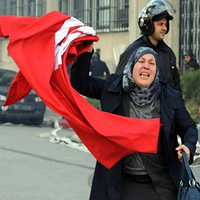Beginning with the Iranian Revolution in 1979, the West has viewed the Middle East and North Africa primarily through the lens of radical fundamentalist political movements. That perspective has narrowed our strategic vision ever since, conflating Shiite with Sunni, evangelicals with fundamentalists, Persians with Arabs, Islamists with autocrats, and so on. But recent events in Tunisia and Algeria remind us that the vast bulk of history's revolutions are fueled by economics, not politics. In this, the struggle for Islam's soul is no different than that of any other civilization in this age of globalization's rapid expansion.
All of the world's major religions grew up under the same Malthusian conditions, in which population growth and wealth creation duked it out in a zero-sum contest. That contest ended with the Industrial Revolution, which allowed the West to free economic growth from the limits of organically achieved accumulation. Since then, humanity has expanded in both size and wealth, albeit unevenly.
Now, as globalization penetrates those regions long kept from its liberating embrace, it reveals fundamentalism's false premise: wealth and piety are not an either/or proposition but an interlinked challenge. For when subsistence is replaced by abundance, individual liberation follows close behind. Such a profound social revolution elicits, on average, greater religiosity among the citizenry -- not less. When "we're moving on up," we naturally seek as many moral handgrips as possible, struggling mightily to maintain a spiritual perspective that guides our day-to-day choices. So when globalization barges into any traditional society, not all of the accompanying rise in religiosity is bad, because only a small fraction of it actually represents a rejection of the newfound opportunities as "sinful."

